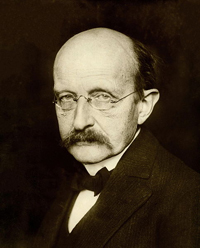Max Planck
| Max Karl Ernst Ludwig Planck (April 23, 1858 - October 4, 1947) was a German theoretical physicist whose discovery of quantum mechanics revolutionized modern physics. He was born into a scholarly family in Kiel, Holstein during a period of constant war; is father was a law professor and his grandfather and great-grandfather were theology professors. When the family moved to Munich Planck came under the tutelage of mathematician Herman Mueller, who taught him astronomy, mechanics and mathematics. At the University of Munich he studied physics, against the advice of a professor, who believed everything had already been discovered. By 1888 had earned a doctorate; in 1892 he became a full professor at the Frederick Wilhelms University. In 1894 he turned his attention to the issue of black body radiation, which had baffled his peers. In 1899 he proposed the “principle of elementary disorder” as an explanation which corresponded well with the experimental data. He revised his approach with the formulation of the Plank black-body radiation law. Uncomfortable with the implications, in what he called "an act of despair", he postulated that electromagnetic energy could be omitted only in a quantized form and proposed what has come to be known as the Plank constant or the Plank action quantum. Applications of the theorem were not immediately obvious but became apparent over time and led to Planck being awarded the Nobel Prize in Physics in 1918. In 1948, the German scientific institution Kaiser Wilhelm Society was renamed Max Planck Society and now includes 83 institutions representing a wide range of scientific directions. |
The Origin and Development of the Quantum Theory
Quantum theory was formulated by German physicist Max Planck while seeking the reason that radiation..
$7.99


